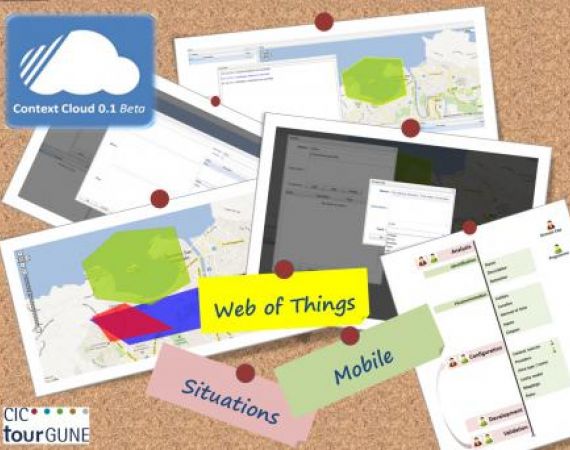Posted on Fri 16 Mar 2012
David Martin’s Lunchtime Talk: Context Cloud: a Web Platform for the Collaborative Development of Context-Aware Systems
David Martin has a background in computer engineering, he is currently studying for his PhD and working as a senior researcher at CICtourGUNE, the Centre for Cooperative Research in Tourism, who explore and research tourism and mobility. CICtourGUNE have three main research arms: tourism systems and…

David Martin has a background in computer engineering, he is currently studying for his PhD and working as a senior researcher at CICtourGUNE, the Centre for Cooperative Research in Tourism, who explore and research tourism and mobility. CICtourGUNE have three main research arms: tourism systems and media, which investigates destination management systems, human mobility and technology involving research around context aware computing and tourism and environments, which engages with ambient intelligence.
Context cloud’s starting point was a vision of enabling everyday objects to connect to the internet to then provide users with services and applications directly to their specific context. The most common example of this is a mobile environment: these days most of us own or have access to smart phones, which hold the capacity to get online and deliver information to any location.
Context Cloud offers a more developed and personal approach in doing this; the user’s specific information becomes an essential component to the provided service to ensure optimum user experience. David posed the question: “How can we personalise and adapt services for people’s need in ubiquitous computing environments?”
What Context Cloud suggests is to develop systems so they are able to obtain and process information as context data: the location of user, the time and weather for example and adapt it’s behaviour accordingly.
The development of these types of services is quite difficult for programmers because they have to perform a number of tasks. Firstly they have to extract context data from the specific source, the information then requires processing through a data model transforming it to high-level context data, which then has to be managed. The service then has to be adapted in order to react to the specific situation. It is therefore quite a big job for a programmer to identify and define all of the immediate situations, locate and provide an appropriate solution to all of the posed questions.
An application domain expert is able to make theses decisions fast and effectively. There is a diverse range of applications available, for example manufacturing in the tourism industry, the programmer will not have access to domain information. This is where domain experts are required to identify the user’s situation. Development methodologies promote collaboration between programmers and domain experts to secure the development of the service.
David gave an example of a tourist in a hotel room complete with context aware umbrella stand! The tourist wants to go outside and it is raining, the umbrella stand detects this using a presence sensor and changes its colour to remind the tourist to take the umbrella.
Context Cloud can be considered as a black box that transforms low-level data into high-level data such as specific situations of people. This information can then be outputted to be used by systems to react or adapt to the situation. Context Cloud is a web platform for the collaborative development of context aware systems. Domain experts communicate with programmers to provide specific context data and the programmes can implement the appropriate service using that output.
Questions from audience
How would this work as a group experience? What are your thoughts about the user’s involvement in the process?
In the case of a group, the user would need to provide more context information. There could be an application available allowing users to specify detailed parameters in order to receive appropriate information from the service.
Do you envisage that this is the type of platform that can be used by everyone?
Yes, the idea is to provide an open platform that can be used by anyone to develop any kind of service. Anyone will be able to register to have our own context cloud, you will then be able to send your own context data and manage it in anyway you see fit.
Are you able to use history or previous information to change the information a user might receive?
Yes there are more advanced functionalities in the rules of Context Cloud. One of these is the history of context data which allows the platform to store that last 10 areas of the user, so this information can be taken into consideration when delivering alerts, for example if it is processed that the user has been to a number of area types, the programmer can adapt the alerts that are then delivered.
There is also the opportunity to store temporary operators: temporary rules that can take particular data into account and then act accordingly.